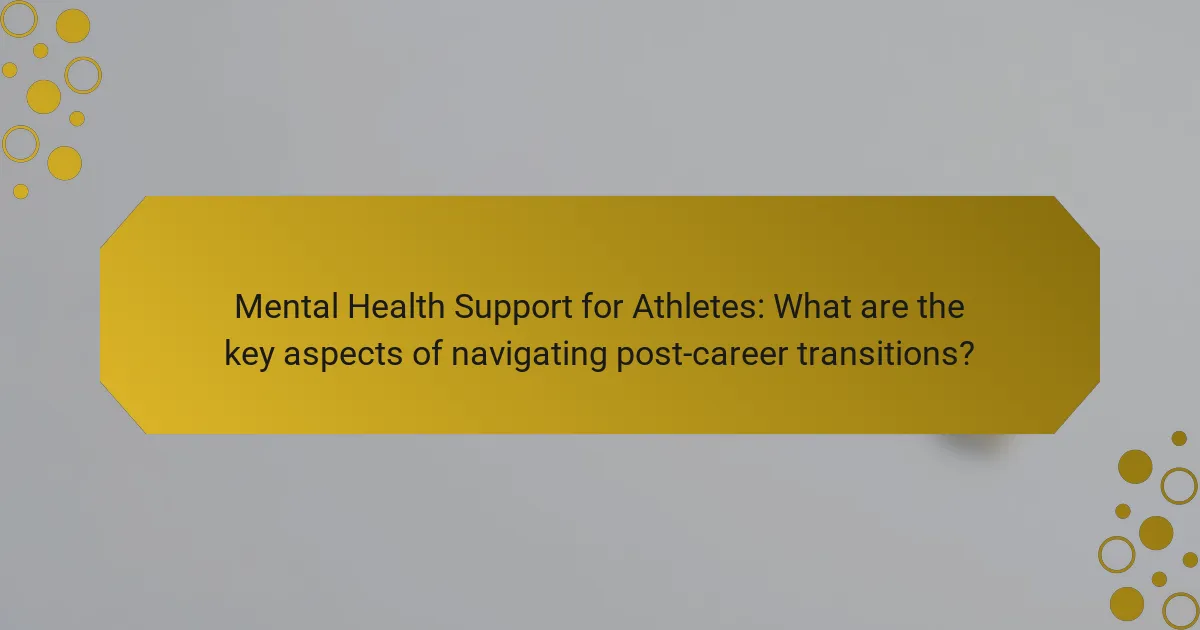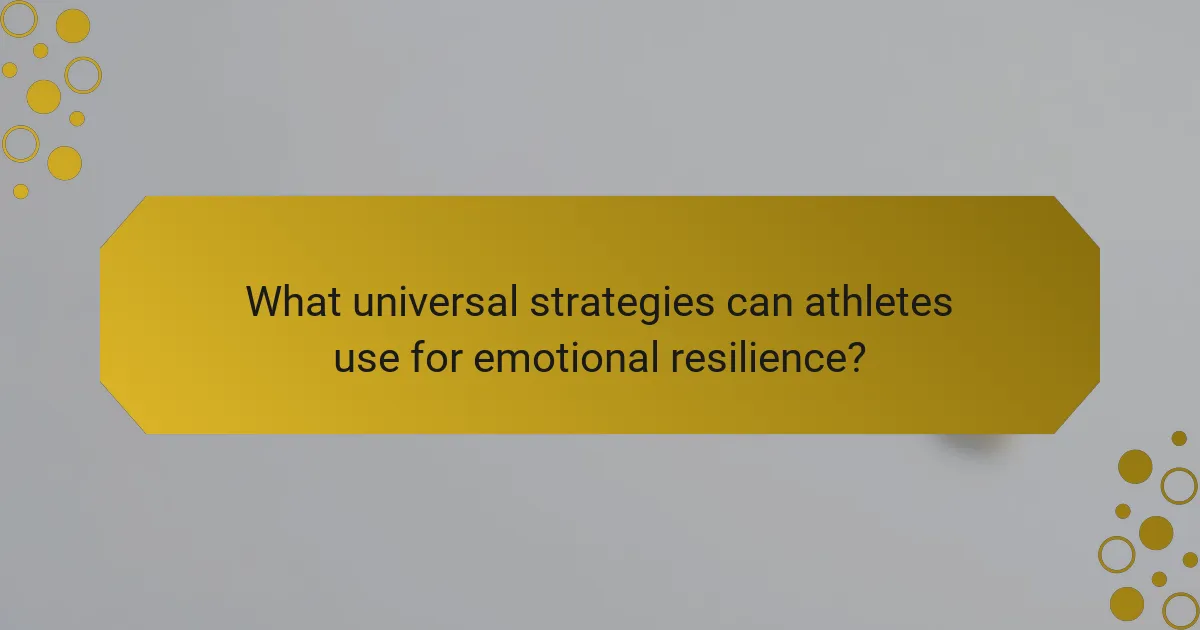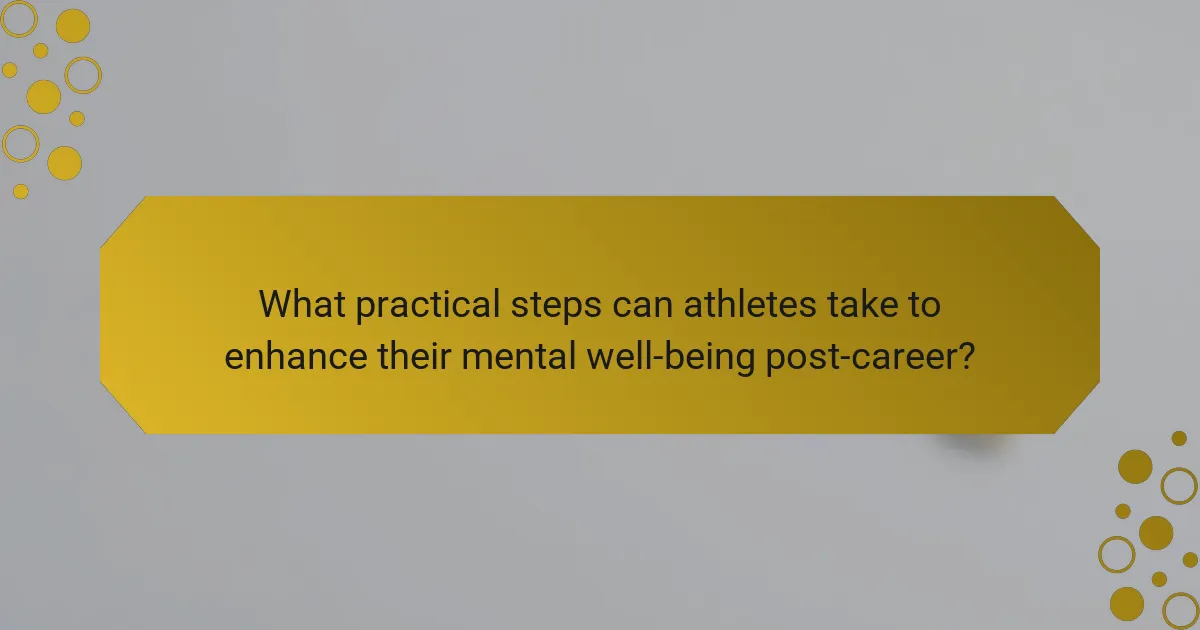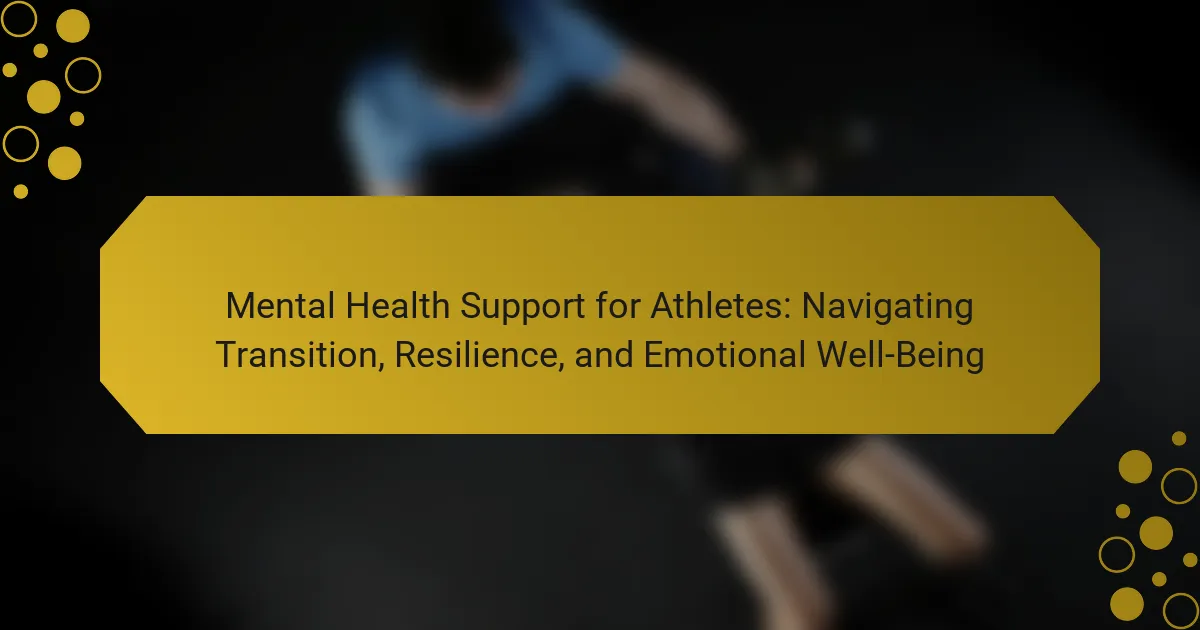Mental health support for athletes is crucial during post-career transitions, addressing resilience and emotional well-being. Key aspects include access to counselling services, peer support networks, and skill development workshops. Mindfulness practices and effective goal-setting enhance emotional resilience, while individualised care and stigma reduction initiatives promote open discussions about mental health. Engaging in structured support systems can significantly improve athletes’ mental health during this challenging phase.

Mental Health Support for Athletes: What are the key aspects of navigating post-career transitions?
Mental health support for athletes during post-career transitions focuses on resilience and emotional well-being. Key aspects include access to counselling services, peer support networks, and skill development workshops. Counselling provides personalised strategies to cope with identity shifts, while peer support fosters shared experiences. Skill development enhances adaptability, preparing athletes for new career paths. Implementing these supports can significantly reduce anxiety and depression, promoting a healthier transition.
Why is mental health crucial during an athlete’s transition?
Mental health is crucial during an athlete’s transition because it directly impacts their emotional well-being and resilience. Athletes face significant changes, such as retirement or shifting roles, which can lead to stress and identity crises. Proper mental health support facilitates adaptation to these changes, ensuring athletes maintain a positive outlook and continue to thrive. Research indicates that athletes who receive mental health resources during transitions experience lower anxiety levels and improved life satisfaction. This support is essential for fostering long-term emotional health and stability in their post-competitive careers.
How does retirement impact an athlete’s emotional well-being?
Retirement can significantly impact an athlete’s emotional well-being by leading to feelings of loss and identity crisis. Many athletes struggle with the transition from their active careers, facing challenges such as decreased social interaction and loss of structure. Emotional support systems, including mental health counselling and peer networks, are crucial during this period. Studies indicate that athletes who engage in mental health support report higher resilience and better emotional adjustment post-retirement.
What are common mental health challenges faced by retired athletes?
Retired athletes commonly face mental health challenges such as depression, anxiety, and identity crises. Transitioning from competitive sports to everyday life can trigger feelings of loss and uncertainty. Research indicates that nearly 30% of retired athletes experience significant mental health issues. Support systems and mental health resources are crucial for fostering resilience and emotional well-being during this transition.
What role does identity play in an athlete’s post-career mental health?
Identity significantly impacts an athlete’s post-career mental health by influencing their sense of purpose and self-worth. Transitioning from a highly recognised sports figure to civilian life can lead to identity crises, resulting in anxiety and depression. Research indicates that athletes often struggle with loss of status and community, which can exacerbate mental health challenges. Support systems that reinforce identity beyond sports can aid in this transition, fostering resilience and emotional well-being. Engaging in new roles and activities helps redefine self-identity, promoting healthier mental states post-career.
How does the loss of routine affect mental health after retirement?
The loss of routine after retirement can significantly impact mental health. It often leads to feelings of isolation, decreased motivation, and anxiety. Without structured daily activities, retired individuals may struggle with purpose and identity, which can exacerbate mental health issues. Establishing new routines and engaging in social activities can mitigate these effects, promoting resilience and emotional well-being.

What universal strategies can athletes use for emotional resilience?
Athletes can enhance emotional resilience through mindfulness, goal-setting, and social support. Mindfulness practices, such as meditation, promote self-awareness and stress management. Effective goal-setting helps maintain focus and motivation during transitions. Building a strong support network fosters connection and provides emotional outlets. These strategies collectively contribute to improved mental health and overall well-being.
How can athletes build a support network during transition?
Athletes can build a support network during transition by engaging with peers, coaches, and mental health professionals. Establishing connections with former athletes who have successfully navigated similar transitions can provide valuable insights and encouragement. Joining support groups or online forums dedicated to athlete mental health can foster community and shared experiences. Additionally, seeking mentorship from seasoned professionals can enhance resilience and emotional well-being during this challenging period.
What coping mechanisms are effective for managing stress and anxiety?
Effective coping mechanisms for managing stress and anxiety include mindfulness techniques, physical activity, and social support. Mindfulness practices, such as meditation and deep breathing, help athletes stay present and reduce anxiety levels. Regular physical activity releases endorphins, which improve mood and resilience. Engaging with supportive peers or professionals fosters emotional well-being and provides a safe outlet for feelings.
How important is seeking professional help for mental health?
Seeking professional help for mental health is crucial for athletes during transitions. It fosters resilience and enhances emotional well-being. Research indicates that athletes face unique stressors, making support essential for managing mental health effectively. Professional guidance provides tailored strategies to cope with challenges, ensuring athletes maintain peak performance and personal fulfilment.

What unique attributes influence mental health support for athletes?
Unique attributes influencing mental health support for athletes include individualised care, sport-specific challenges, stigma reduction, peer support systems, and access to specialised resources. These factors create a tailored approach that addresses the unique pressures athletes face, enhancing their emotional well-being. Individualised care focuses on personal mental health needs, while sport-specific challenges recognise the unique stressors of different sports. Stigma reduction initiatives promote open discussions about mental health, encouraging athletes to seek help. Peer support systems foster a sense of community, which is crucial for resilience. Access to specialised resources ensures athletes receive appropriate interventions, enhancing their overall mental health support.
How do personal experiences shape an athlete’s mental health journey?
Personal experiences significantly influence an athlete’s mental health journey by shaping resilience and coping strategies. Athletes often face unique challenges, such as intense pressure and public scrutiny, impacting their emotional well-being. Support systems, including coaches and mental health professionals, play a crucial role in helping athletes navigate transitions, fostering a sense of belonging and stability. Furthermore, sharing personal stories can enhance community support and reduce stigma around mental health issues in sports.
What role does the athlete’s sport play in their emotional challenges?
The athlete’s sport significantly influences their emotional challenges. Different sports present unique pressures, expectations, and environments that affect mental health. For example, high-contact sports often lead to anxiety about injuries, while individual sports can amplify feelings of isolation. The culture surrounding a sport can either support or hinder emotional well-being, impacting resilience and transition. Understanding these dynamics is essential for effective mental health support tailored to athletes’ specific experiences.

What are the rare but notable mental health resources available for athletes?
Athletes can access rare mental health resources that specifically address their unique challenges. Organisations like the Athlete Assistance Programme provide tailored support, while initiatives like the Mental Health in Sport Conference focus on education and awareness. Additionally, the use of teletherapy platforms offers athletes convenient access to professional help. These resources enhance resilience and emotional well-being during transitions in their careers.
How can peer support groups specifically aid retired athletes?
Peer support groups provide retired athletes with essential emotional support, fostering resilience during their transition to post-sport life. These groups create a safe space for sharing experiences, reducing feelings of isolation. Participants can exchange coping strategies, which enhances mental well-being. Research indicates that athletes in peer support settings report higher satisfaction and improved mental health outcomes. Additionally, the shared understanding within these groups helps members navigate identity changes, contributing to a more positive adjustment period.
What innovative mental health programs are being developed for athletes?
Innovative mental health programs for athletes focus on resilience and emotional well-being. Programs like mindfulness training, peer support networks, and mental skills coaching are gaining traction. For instance, the “Athlete Mental Health Initiative” promotes open discussions and resources tailored for athletes. Research indicates that these programs enhance coping strategies and reduce stigma around mental health. Integration of technology, such as mobile apps for mental health tracking, further supports athletes in their journey to wellness.

What practical steps can athletes take to enhance their mental well-being post-career?
Athletes can enhance their mental well-being post-career by engaging in structured support systems. Establishing a routine that includes therapy, peer support groups, and physical activity can significantly aid the transition.
1. Seek professional mental health support to address emotional challenges.
2. Join athlete-specific support groups for shared experiences and advice.
3. Maintain physical fitness through regular exercise to boost mood and resilience.
4. Explore new hobbies or interests to foster a sense of purpose and identity.
5. Develop a strong social network to provide encouragement and connection.
6. Practice mindfulness techniques such as meditation to reduce stress and improve emotional regulation.
What are the best practices for maintaining mental health after retirement?
To maintain mental health after retirement, athletes should engage in regular physical activity, seek social support, and establish new routines. These practices promote emotional well-being and resilience during the transition. Regular exercise has been shown to reduce anxiety and depression, while social connections provide a sense of belonging. Establishing new daily routines helps create a structured environment that fosters stability.
What common mistakes do athletes make in their post-career mental health journey?
Athletes often overlook mental health support during their post-career transition. Common mistakes include neglecting emotional well-being, failing to seek professional help, and isolating themselves from social networks. Many athletes struggle with identity loss, leading to depression and anxiety. Additionally, they may underestimate the importance of resilience training, which can aid in adjusting to life after sports. Seeking support from peers and mental health professionals is crucial for navigating this challenging journey.
How can athletes optimise their transition for better emotional health?
Athletes can optimise their transition for better emotional health by prioritising mental health support, developing resilience, and fostering emotional well-being. Engaging in mindfulness practices can enhance self-awareness, while establishing a strong support network improves coping strategies. Regular communication with mental health professionals offers tailored guidance, promoting adaptive emotional responses. Additionally, setting realistic goals during transitions aids in maintaining motivation and focus, ultimately contributing to overall emotional stability.
